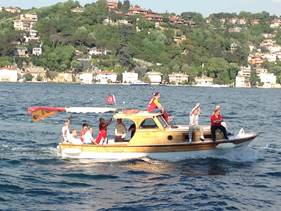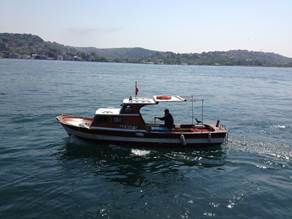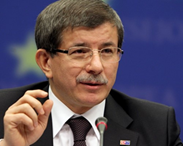
ESI newsletter5/2013
May 21, 2013
May 21, 2013
 |  |
A new ESI report, part of the ESI Schengen White List project supported by Stiftung Mercator, analyses the current stalemate between Turkey and the European Union concerning visa liberalisation. It also suggests a concrete way forward:
Visa liberalisation has been a crucial element in the EU's relations with Romania, Serbia and Albania. Yet until recently it had not even appeared on the agenda of talks between Brussels and Ankara.
On 21 June 2012, the Council invited the Commission to establish a dialogue with Turkey with a view to launching a visa liberalisation process. Almost a year has passed since these Council conclusions. The dialogue on visa liberalisation has yet to begin.
Is this the future of EU-Turkey relations: silence, frustration and an inability to talk even about issues of truly common interest?
 | |
Cecilia Malmstrom | |
From the European Commission's point of view, what needs to happen next is obvious. Turkey must accept what the EU Council specified as the single most important condition for a visa liberalisation dialogue: signing a readmission agreement with the EU. Then the Commission would hand over to Turkey a list of official requirements for visa free travel, known as the "roadmap".
As leaders in Ankara understand it, however, the EU's offer to them is as follows:
"Please fulfil our 70 conditions. Spend more on border control. Help us close your borders to irregular migration to the EU. Ratify and implement a readmission agreement to take back tens of thousands of irregular migrants who reached the EU by transiting Turkey. Offer everybody the possibility to apply for asylum in Turkey and treat the asylum seekers well so they do not go to the EU. Once you do all this, the EU might vote on whether or not to lift the visa requirement for Turkish citizens. Unfortunately we cannot tell you now when such a vote will happen. Nor do we know whether such a proposal would get enough votes to pass in the Council. In the meantime, please trust in our good intentions."In the eighth year of accession talks, however, trust in the EU is a scarce resource in Ankara.
 |  |  | |
Egemen Bagis and Ahmet Davutoglu; will they cut this knot? | |||
Never before has a country negotiated EU accession for years without its citizens able to travel to Europe without a visa. As Turkey and the EU move towards the fiftieth anniversary of their strategic relationship, which started with the 1963 Association Agreement, the time to address visa liberalisation is now.
The EU has not resisted the temptation to model the visa liberalisation process after the EU accession talks. However, the EU-Turkey visa dialogue cannot be successful if it is seen as a quasi-accession exercise. Both sides want something: the EU wants a readmission agreement and help in addressing illegal migration from Turkey; Turkey wants visa-free travel.
ESI suggests that Turkish diplomacy cut the Gordian knot of visa free travel in five strokes.
- Turkey should remind the EU that the visa dialogue is not part of the accession process and that instead, it is a negotiation between equals. Turkey should state publicly at the outset that it will not accept everything in the EU roadmap.
- Turkey should declare that it will sign, ratify and then even implement the readmission agreement in line with its legal obligations. However, it should also make clear that under the terms of the readmission agreement negotiated with the EU it will not be obliged to take back third-country nationals until three years after the agreement enters into force.
- Turkey should confirm that it expects to see steady and measurable progress in the mobility of bona fide Turkish visitors to the EU, including a decline in the rejection rate for visa applications and an increase in the share of long-term multiple-entry visas issued.
- There are vital areas where Turkey can help build trust inside the EU. One is reducing irregular migration to the EU via Turkey's land and maritime borders. Another is readmission of irregular third-country migrants. Since Turkey is under no legal obligation to do so for three years, it can decide on the numbers to take back from EU member states all by itself.
- Turkey should set a realistic deadline for the conclusion of the visa dialogue. By the end of 2015 at the latest, Turkish travellers should enjoy visa-free travel to the EU. If until then the EU fails to vote on visa liberalisation, or if the vote is negative, Turkey should notify the EU that it will void the readmission agreement.
 |  | |
In recent weeks we have presented ESI research in Vienna, at the OSCE's annual Supplementary Human Dimension Meeting (on freedom of movement in Europe); in Edirne, speaking about the promise of Europeanisation; in Budapest, at a debate on Building Sustainable Peace in the Western Balkans,moderated by the president of Central European University, John Shattuck; in Bratislava, discussing EU enlargement in SEE at a meeting of the European People's Party.
On Wednesday 22 May we will present our analysis at two events in Brussels:
At 12:30, the Open Society European Policy Institute and ESI organize an event and debate on the Balkans on the eve of Albanian parliamentary elections in June 2013:
Lost in limbo? EU enlargement and the southern Balkans – Albania, Kosovo, MacedoniaThen at 19:00 the Representation of the State of Baden-Württemberg to the European Union, ERSTE Stiftung, and ESI invite to an event on:
Croatia's European transformation - a film screening of 'Twilight of Heroes – Croatia, Europe and the International Tribunal' followed by a debate.As always we are loo